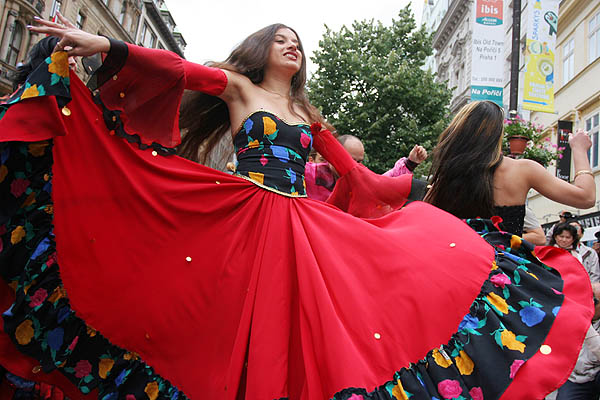Wikimedia Serbia organized the fourth global edit-a-thon to celebrate World Roma Day. During this event, volunteers worldwide wrote and improved articles on the Roma people and their history and culture. This campaign aims to combat prejudice and discrimination against Roma by spreading knowledge on Wikipedia and other Wiki projects. This year Roma Day Edit-a-thon was supported by Wikimedia España. Wikimedia Finland, Shared Knowledge, Wikimedians of Albanian Language User Group, Wikimedia Community User Group Greece, Wikimedia Community User Group Hungary Slovak Romani Wikipedia Community, Wikimedians of the Republic of Srpska, Wikipedians of Serbo-Croatian Language User Group, and Wikipedians of Bosnian Language User Group.
Preparations
In the accordance with the experience from previous years, a page was created on Meta with a table containing a list of articles showing whether they exist in the mentioned language edition of Wikipedia or not. The list included different subcategories of topics, which made the list much easier to observe and maneuver. This system allows participants to work on translating articles if sources and literature on a given item do not exist in their language. A lot of time has been invested in inviting Wikimedia affiliates and communities to join and support this event. We primarily focused on countries and regions with a significant Roma minority. Fortunately, the response was good, and many affiliations and user groups organized a local version of this campaign.
Results
The edit-a-thon lasted from the 3rd until the 9th of April, however, some user groups extended the edit-a-thon until the 14th of Aprile. We proudly announce that this year we had another successful edit-a-thon, as 49 participants from 11 language versions of Wikipedia wrote 105, and improved 67 articles. Moreover, the Finnish, Serbian, and Albanian Wikipedia communities had especially significant contributions to this event. Editors were not active only on Wikipedia, but on Wikidata as well, and during this edit-a-thon 16 new items were created and 71 were improved. The final results can be viewed on Meta-wiki.
“The Finnish Wikipedia community sought topics for their weekly edit competitions and chose Roma culture and people, as there were gaps in their history on Wikipedia, and the International Roma Day also added external relevancy to the topic. Organizing weekly edit competitions also required practical work, like topic lists for the editathon and It was great that you had a ready-made list of what we were able to use. While working on the articles, I noticed again how evident the impact of Finland’s EU membership in the 1990s on Finnish Romani rights is. Post-membership, several achievements occurred for the first time, including the first Romani doctor, a radio program, a Roma culture museum, the creation of a national Roma archive, and the recognition of Romani war veterans. Despite the progress, it was eye-rolling that these milestones happened so late.”
Kimmo Virtanen, Finnish Wikipedia
For a couple of years now, articles on Romani people and their culture have been an integral part of the CEE Spring competition, so editors from Central and Eastern Europe who are interested can contribute to this topic and participate in their local competitions until May 31st. We certainly invite you, whenever you have time, to write an article on Wikipedia on the topic of any minority or marginalized group of people to reduce the existing knowledge gap.

Can you help us translate this article?
In order for this article to reach as many people as possible we would like your help. Can you translate this article to get the message out?
Start translation
